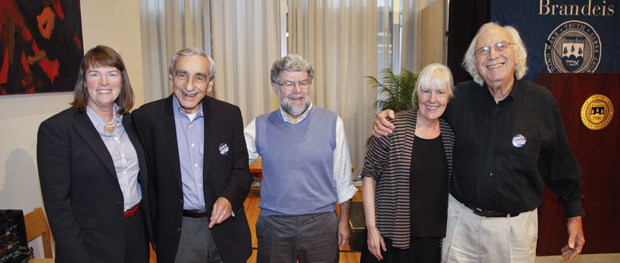Michael Walzer ’56 argues for states to include all communities
The prominent Brandeis alumnus and world renowned political theorist said states have an obligation to defend everyone within their borders
 Photo/Mike Lovett
Photo/Mike LovettLeft to right: Interim President Lisa Lynch, Michael Walzer, Bernard Yack, Marion Smiley and Jules Bernstein '57
The talk before a full audience inside the Rapaporte Treasure Hall provided a critique of Martin Buber’s book, “Paths in Utopia,” which examines the Zionist experiment and the creation of the Jewish state. In the book, Buber posits that a state has a choice of governing through either totalitarian socialism or communal socialism, both of which are manifested in Moscow and Jerusalem, respectively.
But Walzer, who is known worldwide for his perspectives on just and unjust war, political obligation and Zionism, disagreed, arguing “Moscow and Jerusalem do not represent the critical alternatives we face today,” and that “Our choices don’t have proper names, they’re complex and are not exclusive to geographic locations.”
After breaking away from Buber’s socialist dichotomy, Walzer cited the work of French President Leon Blum and Israeli Prime Minister David Ben-Gurion, both of whom argued in favor of a state that takes care of all people within its borders, regardless of their beliefs or way of life.
Walzer first noted that people of the same background, culture or beliefs form communities, and that they are part of states. Because of this, Walzer argued, states are heterogeneous and are, in fact, complex. In spite of those differences, Walzer said even states with a culture and customs that have been adopted by a majority of their people still have a responsibility to welcome and defend the human rights of communities within their borders that are not the mainstream.
“States must be willing to accept those who are desperate,” said Walzer, who later noted that some form of immigration regulation is acceptable. “Everybody needs a state—one that protects them and others with them—one that is strong and decent...Tibetans, Kurds, Palestinians and yes, Jews, too.
In regards to the Zionist experiment, Walzer said the Jewish state has struggled to understand the relationship between community and state.
“A state does not depend on a single way of life,” Walzer said. “Citizenship extends across all communal boundaries.
“I believe that one of the difficulties of the Jewish transition to statehood is the simple fact for almost 2,000 years we, Jews, had no experience governing anyone but ourselves,” Walzer added. “Many of us did not understand the importance of one of the legitimate tasks of the state: to defend the physical well-being of all the people who find themselves within its borders.”
Following the lecture, Walzer participated in a question and answer session with the audience. Questions to Walzer touched on issues of nationalism and immigration, as well as the contemporary topics like the Syrian refugee crisis, European economic and financial turmoil and unrest in the Middle East. The audience, which was comprised of students, faculty, administrators and alumni, applauded Walzer at the event’s conclusion.
“Michael Walzer is one of America’s foremost political theorists and a leading public intellectual,” said Interim President Lisa M. Lynch. “He’s written more than two dozen books, published hundreds of articles in political theory and his work has influenced generations of policymakers and students.”
Walzer came to campus at the invitation of longtime friend Jules Bernstein '57. The Louis D. Brandeis Legacy Fund for Social Justice, which Bernstein and his wife, Linda Lipsett, established, sponsored Walzer's talk in collaboration with the Mandel Center for Humanities and several Brandeis departments: the Department of Philosophy; Department of Politics; Tauber Institute for the Study of European Jewry; the International Center for Ethics, Justice and Public Life; the International Global Studies Program; the History of Ideas Program; the Osher Lifelong Learning Institute at Brandeis; and the Brandeis Alumni Association.
Categories: Alumni, General, Humanities and Social Sciences, Research, Student Life





